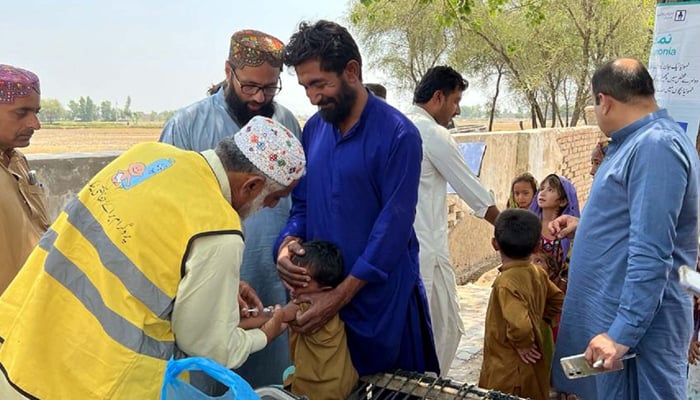Measles spike
Business capital has joined Punjab, which has been battered by an outbreak of pneumonia
In yet another sign of the shortcomings of Pakistan’s childhood immunization efforts, Karachi has been grappling with a sharp spike in measles cases in recent weeks. The business capital has joined Punjab, which has been battered by an outbreak of pneumonia, as one of the Pakistani regions battling and losing lives to vaccine-preventable illnesses. According to health experts, Karachi’s measles surge dates back to last year, with at least 106 children succumbing to the virus in 2023 and an estimated 1200 measles admissions across just three of the city’s hospitals. According to the WHO, measles deaths in Pakistan rose by 43 per cent in 2022, claiming an estimated 136,000 lives, mostly among children, with around 22 million children missing their first measles vaccine dose in the same year. This is despite the launch of a nationwide campaign in November 2021 to immunize over 90 million children against measles and rubella within two weeks. However, given that approximately 38 per cent of Pakistan’s 240.5 million people are under the age of 15, the country’s relatively high birth rate, and a meagre health budget, it is perhaps not too surprising that so many of the nation’s children go unimmunized despite continuing efforts to vaccinate more children.
Medical experts say that Pakistan needs to enhance its healthcare budget to six per cent of its GDP to provide quality healthcare to all. This is many times more than the Rs37 billion reportedly allocated for the health sector in the current fiscal year. Arguably the most frightening thing that Karachi’s measles outbreak shows is that our healthcare system, as it is, cannot even protect all children in the most developed areas of the country where access to healthcare facilities and services are more accessible than in the rural areas. Aside from expanded access to basic healthcare services, this situation also shows a need to increase awareness about the importance of vaccines and counter anti-vaccination propaganda and misinformation more aggressively. Every child in the country has to be vaccinated and no parent should be unaware of what might happen to their children should they not be immunized. Doing so will require not just spending more on healthcare but spending that money in the right areas. Vaccine workers are likely responsible for saving the lives of more children than any other group in the country. They ought to receive compensation and benefits that reflect the importance of their role. It is also essential to recognize that healthcare needs and challenges differ from region to region given the diversity of Pakistan. Tackling socio-economic problems in such a heterogeneous landscape necessitates empowered local governments who can tailor broader initiatives to suit local requirements
-
 Expert Reveals What Makes Investigations Hard In Search Of Savannah Guthrie Mother Nancy: 'Silent Witness'
Expert Reveals What Makes Investigations Hard In Search Of Savannah Guthrie Mother Nancy: 'Silent Witness' -
 'SNL's Strongly Reacts To BAFTA's Racial Slur With Tourette’s Sketch
'SNL's Strongly Reacts To BAFTA's Racial Slur With Tourette’s Sketch -
 Austin Shooting Leaves Multiple Dead, Dozens Injured
Austin Shooting Leaves Multiple Dead, Dozens Injured -
 Meghan Markle Friends Break Silence As Duchess Plan To Return To UK
Meghan Markle Friends Break Silence As Duchess Plan To Return To UK -
 Dua Lipa Stuns Everyone On And Off Stage At 2026 BRIT Awards
Dua Lipa Stuns Everyone On And Off Stage At 2026 BRIT Awards -
 2026’s Most Visited Websites Revealed: ChatGPT Overtakes Major Platforms
2026’s Most Visited Websites Revealed: ChatGPT Overtakes Major Platforms -
 Worst Cricket Moments That Shocked The Game
Worst Cricket Moments That Shocked The Game -
 Prince Harry, Meghan Markle Reach A Crossroads: ‘You Could Lose Everything’
Prince Harry, Meghan Markle Reach A Crossroads: ‘You Could Lose Everything’ -
 F1 Title Race: Who Will Win 2026 Drivers’ And Constructors’ Championships?
F1 Title Race: Who Will Win 2026 Drivers’ And Constructors’ Championships? -
 New Observatory Sends 800,000 Asteroid Alerts In One Night
New Observatory Sends 800,000 Asteroid Alerts In One Night -
 Cher’s Son Elijah Blue Allman Apprehended On Two Counts Of Assault At Elite Prep School
Cher’s Son Elijah Blue Allman Apprehended On Two Counts Of Assault At Elite Prep School -
 Beatrice, Eugenie Now Face Andrew, Sarah's ‘nightmares’: 'They're Hugely Conflicted'
Beatrice, Eugenie Now Face Andrew, Sarah's ‘nightmares’: 'They're Hugely Conflicted' -
 X Debuts Topic Filtering To Help Users Shape Their ‘For You’ Recommendations
X Debuts Topic Filtering To Help Users Shape Their ‘For You’ Recommendations -
 Scientists Built World's First Computer That Learns Like Human Brain
Scientists Built World's First Computer That Learns Like Human Brain -
 Robert Carradine’s Daughter Makes Bombshell Confession As Actor's Death Cause Confirmed
Robert Carradine’s Daughter Makes Bombshell Confession As Actor's Death Cause Confirmed -
 Beatrice, Eugenie Put On Blast: ‘Only Nitwits Wouldn’t See An Association With A Pedophile As Toxic’
Beatrice, Eugenie Put On Blast: ‘Only Nitwits Wouldn’t See An Association With A Pedophile As Toxic’




